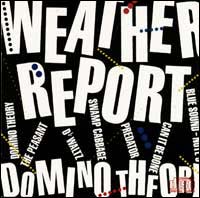| Domino Theory | ||||
|---|---|---|---|---|
 | ||||
| Studio album using 3 live recordingsby | ||||
| Released | April 1984 | |||
| Recorded | 1983 | |||
| Venue | Koseinenkin Hall (Osaka, Japan) | |||
| Studio | The Music Room (Pasadena, California) Sound Castle and Lion Share Recording Studios (Los Angeles, California) | |||
| Genre | Jazz fusion | |||
| Length | 47:28 | |||
| Label | Columbia | |||
| Producer | Joe Zawinul, Wayne Shorter, Omar Hakim | |||
| Weather Report chronology | ||||
| ||||
| Review scores | |
|---|---|
| Source | Rating |
| Allmusic | |
| The Rolling Stone Jazz Record Guide | |
Domino Theory is the twelfth studio album by jazz fusion band Weather Report, released in April 1984. It is the second studio album to feature the Hakim-Bailey-Rossy rhythm section. The album contains seven tracks, three of which were recorded live.
Contents
The title of the album is a reference towards the American geopolitical theory of the same name which gained popularity between the 1950s and 1980s.